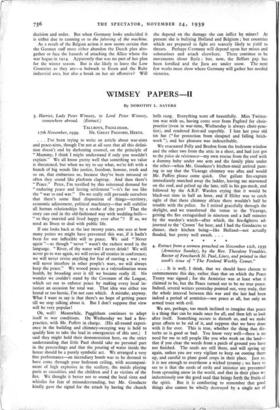WIMSEY PAPERS II
By DOROTHY L. SAYERS TALLBOYS, PAGGLEHAM,
17th November, 1939. Nit. GREAT PAGFORD, HERTS.
. . . I've been trying to write an article about war-aims and peace-aims, though I'm not at all sure that all this defini- tion doesn't end by darkening counsel, on the principle of " Mummy, I think I might understand if only you wouldn't explain." We all know pretty well that something we value is threatened, but when we try to say what, we're left with a bunch of big words like justice, freedom, honour, truth and so on, that embarrass us, because they've been misused so often they sound like platform claptrap. And then there's " Peace." Peter, I'm terrified by this reiterated demand for " enduring peace and lasting settlement "—it's far too like the " war to end war." Do we really still persuade ourselves that there's some final disposition of things—territory, economic adjustment, political machinery—that will stabilise all human relationships by a stroke of the pen? That the story can end in the old-fashioned way with wedding-bells- " so they married and lived happy ever after "? If so, we need an Ibsen to deal with public life.
If one looks back at the last twenty years, one sees at how many points we might have prevented this war, if it hadn't been for our inflexible will to peace. We said " Never again "—as though " never " wasn't the rashest word in the language. " River, of thy water will I never drink! We will never go to war again, we will revise all treaties in conference; we will never revise anything for fear of starting a war ; we will never interfere in other people's wars, we will always keep the peace." We wooed peace as a valetudinarian woos health, by brooding over it till we became really ill. No wonder we couldn't stand by the Covenant of the League, which set out to enforce peace by making every local in- justice an occasion for total war. That idea was either too brutal or too heroic, I'm not sure which. A mistake, anyway. What I want to say.is that there's no hope of getting peace till we stop talking about it. But I don't suppose that view will be very popular!
Oh, well! Meanwhile, Paggleham continues to adapt itself to war conditions. On Wednesday we had a fire- practice, with Mr. Puffett in charge. (His all-round experi- ence in the building and chimney-sweeping way is held to qualify him to take the lead in emergencies of this sort.) I said they might hold their demonstration here, on the strict understanding that little Paul should take no personal part in the proceedings and that the pouring of water inside the house should be a purely symbolic act. We arranged a very fine performance—an incendiary bomb was to be deemed to have come through your bedroom ceiling, with accompani- ment of high explosive in the scullery, the maids playing parts as casualties, and the children and I as victims of the fire. We thought it better not to sound the local siren and whistles for fear of misunderstanding, but Mr. Goodacre kindly gave the signal for the attack by having the church bells rung. Everything went off beautifully. Miss Twitter- ton was with us, having come over from Pagford for choir- practice (even in war-time, Wednesday is always choir-prac- tice), and rendered first-aid superbly. I lent her your old tin hat (" for protection from shrapnel and falling brick- work "), and her pleasure was indescribable.
We evacuated Polly and Bredon from the bedroom window and the other two from the attic in a sheet, and had just got to the piece de resistance—my own rescue from the roof with a dummy baby under one arm and the family plate under the other—when Mr. Goodacre's kitchen-maid arrived pant- ing to say that the Vicarage chimney was afire and would Mr. Puffett please come quick. Our gallant fire-captain immediately snatched away the ladder, leaving me marooned on the roof, and pelted up the lane, still in his gas-mask, and followed by the A.R.P. Warden crying that it would be black-out time in half an hour, and if Hitler was to catch sight of that there chimney ablaze there wouldn't half be trouble with the police. So I retired gracefully through the skylight, and we transferred the venue to the Vicarage, getting the fire extinguished in nineteen and a half minutes by the warden's watch—after which, the fire-fighters ad- journed to the ' Crown' for beer, and I had the Goodacres to dinner, their kitchen being—like Holland—not actually flooded, but pretty well awash. . . .




































 Previous page
Previous page